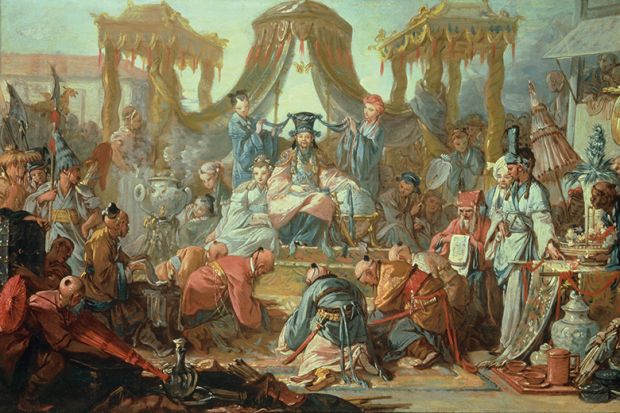For much of the early modern period, and up to the Enlightenment, Asia was economically, politically and culturally a counterweight to Europe – and Europeans knew it. The remarkable historical significance of Europe’s New World experience has too often obscured the importance of the longer-term relationship with Asia, and the way that it also shaped the emergence of Western modernity. And yet, as Jürgen Osterhammel amply demonstrates in Unfabling the East, accounts of how Enlightenment Europeans perceived the East have too often suffered from a tendency to simplify the subject.
One important flaw has been to anachronistically transfer the imperialist assumptions of the 19th century back to a period where the West was not yet dominant, and failing to appreciate the amount of genuine curiosity and admiration felt towards countries such as China. To compound this, writers such as Edward Said emphasised a simple East-West dichotomy, when much of the evidence suggests that European travellers and thinkers were careful to record and reflect upon the extreme ethnic, political and cultural diversity of Asia.
The idea that Europeans were systematically blinded by their cultural assumptions or lacked any genuine desire to understand what they saw in Asia is not simply empirically wrong, as Osterhammel’s hefty volume makes clear. It also fails to capture the extent to which our own century, now that we have been forced to reassess the balance of power between the West and the countries of Asia, often resonates with many of the perceptions of the European Enlightenment. A fresh and broad look at earlier European experiences of Asia retrieves a cultural resource that is highly relevant today.
Osterhammel’s book is methodologically significant in its rejection of two traditional approaches. One attempted to assess early modern European accounts of Asia primarily for their capacity to generate an empirically sound description of its lands and peoples, as measured by the standards of modern scholarship. This was the stupendous multi-volume project proposed by Donald F. Lach in his Asia in the Making of Europe. The contrary approach is the “sceptical” reading of European sources on Asia as misrepresentations driven by self-referential ideological concerns.
Adopting a kind of middle position, Osterhammel insists on the relativity of cultural distances, as well as the impossibility of a completely unbiased understanding of foreign cultures, and offers two concrete theses in relation to the European Enlightenment. The first is that, while Europe had a strong identity as a civilisation, as expressed in a Republic of Letters transcending national and religious divisions, the all-encompassing concept of Asia was a European construct primarily defined by the mechanism of opposition. At the same time, this did not preclude direct engagement with its realities, or lead to an exaggerated degree of ethnocentrism: rather the contrary, throughout much of the 18th century, Europeans often practised an exceptional kind of inclusive ethnocentrism, one that sought to encompass the various cultural realities of the world – in Asia and elsewhere – within an (inevitably) Eurocentric global vision. This, as a matter of fact, often involved a remarkable amount of cultural self-reflectivity, as exemplified by Montesquieu’s Persian Letters, and even occasional efforts to incorporate genuine Asian voices.
Osterhammel’s nuanced position is sensible and intelligent, although it will not sound particularly novel to many of those who have been active in the field of early modern travel writing and cultural encounters in the past 30 years. In fact, it is to the credit of Osterhammel that he expressed all this back in 1998, when the German edition of this book was published, and at a time when historians proposing a higher-resolution analysis of the complex cultural mechanisms by which European perceptions of Asia were formed and transformed were still in a minority. For this new English version, he has been able to take account of much of the new scholarship that has flourished since, as revealed by its massive bibliography, and the result is an even richer and more detailed account.
The book is divided into two large sections. The first deals with the process by which travellers collected information, and how this lived experience was transformed into texts. The second set of chapters charts specific themes, such as the various images of oriental rulers, the concepts of barbarism and civilisation, social institutions such as slavery or caste, the status of women and the politically crucial topic of despotism. The analysis is rich in detail, the writing fluid and lucid, and the close attention to individual travel writers and their contexts is especially enjoyable. We are also made to understand that most Europeans in Asia were not like the sophisticated Jesuit missionaries in Beijing who spoke Mandarin and taught mathematics, or those erudite and curious travellers pursuing a scientific agenda, but rather traders, mercenaries and mariners who were generally insensitive to local cultural assumptions and were often perceived as arrogant and impolite, when not drunk and violent.
The book covers the whole period from about 1680 to 1830, and this allows Osterhammel to widen his range of sources from late 17th-century accounts such as Jean Chardin’s description of Persia (without which Montesquieu’s analysis of oriental despotism would be impossible to understand) to the post-1800 British imperial historians of Persia, Afghanistan, India or Java. More important, it lets him develop what is perhaps the book’s most powerful argument, the depth of the transformation of attitudes that took place roughly between 1780 and 1830. In effect, as Europeans increasingly found themselves in a position of military and political dominance, they also sharpened their understanding of the history of civilisation in order to emphasise a sense of institutional, cultural and racial superiority towards even the most civilised peoples of Asia. Rather than a continuity of long-held stereotypes, Osterhammel perceives a significant change of discourse that accompanied what historians such as Chris Bayly defined as Europe’s “imperial meridian”.
Unfabling the East is at its weakest, by contrast, in its lack of appreciation of how many of the cultural mechanisms that it depicts were not new or exclusive to the Enlightenment, but went back to the 16th and 17th centuries. By the 1550s, well before the great travel collectors of the 18th century, the Venetian Ramusio had already defined the genre’s strategic importance to the European Republic of Letters. In the early 1600s, Pietro della Valle had already collected mummies and Coptic manuscripts in Egypt, spent years in the court of Shah Abbas writing poetry in Persian, copied ancient inscriptions in Persepolis, interviewed satis in India and declared himself a citizen of the world.
The true significance of Europe’s early modern encounter with Asia is only apparent if we also consider what the encounter of the peoples of Asia with Europe was like. Europeans had an advantage in the fact that many of them, as missionaries, commercial agents or colonial officials, became long-term residents in the cities and courts of Asia, and were thus able to deepen their understanding of the language, customs and sometimes history and religion of their host societies. While there were some examples of Asian travellers to Europe who left valuable accounts, we can seldom detect an intercultural dialogue of genuine reciprocity.
It was this cultural imbalance, rather than an absolute disparity of economic or military power, which was characteristic of the myriad encounters that took place up to the 18th century. The reasons why, for a couple of centuries, Europeans were able to assert their primacy over all other civilisations must be disentangled from the no less interesting question of why, in the previous two and a half centuries, they had been so interested in learning systematically about the rest of the world, and most especially Asia. The fact that overt colonialism is thankfully over makes this question more, rather than less, urgent.
Joan-Pau Rubiés is ICREA research professor in history at Pompeu Fabra University, Barcelona. He is the author of Travel and Ethnology in The Renaissance: South India through European Eyes 1250-1625 (2000) and is currently completing a monograph titled Europe’s New Worlds: Travel Writing and the Origins of the Enlightenment.
Unfabling the East: The Enlightenment Encounter with Asia
By Jürgen Osterhammel
Translated by Robert Savage
Princeton University Press
696pp, £27.00
ISBN 9780691172729
Published 27 June 2018
The author
Jürgen Osterhammel, professor of modern and contemporary history at the University of Konstanz, spent the first 24 years of his life in small towns in provincial Germany. After completing a degree at the University of Marburg, he says, he “went to the London School of Economics, where I was fortunate enough to study, among others, with a great historian, Professor Ian Nish”. Even then, he “always left German history to my talented fellow researchers. Early on, my own interest focused on modern China and the British Empire.”
Although such a combination “almost automatically lead[s] you to global history”, Osterhammel has “never define[d his] work in geographical terms. What I care for is problems of connection and comparison.” His career has been largely split between the UK and Germany, with a PhD at the University of Kassel, followed by a fellowship at the German Historical Institute in London, a senior lectureship at the University of Freiberg and then a professorship at the University of Hagen. He has also worked at the Graduate Institute of International Studies in Geneva and as a fellow at the Netherlands Institute for Advanced Study in the Humanities and Social Sciences.
In an era when the global balance of power seems to be shifting towards Asia, Osterhammel believes that the period covered by Unfabling the East may have important lessons for us.
“Europe in the 18th century was impressively open towards Asia,” he explains. “That was not too difficult since East and West still maintained some kind of power equilibrium. Today, we should stand up for universal values of the Enlightenment such as tolerance, equal life chances, democracy and the rule of law. They are rejected by some governments in Asia but shared by a huge number of people in the continent.”
Matthew Reisz
POSTSCRIPT:
Print headline: Reorienting the West’s narrative
Register to continue
Why register?
- Registration is free and only takes a moment
- Once registered, you can read 3 articles a month
- Sign up for our newsletter
Subscribe
Or subscribe for unlimited access to:
- Unlimited access to news, views, insights & reviews
- Digital editions
- Digital access to THE’s university and college rankings analysis
Already registered or a current subscriber? Login







